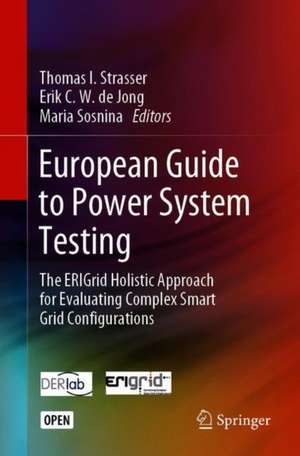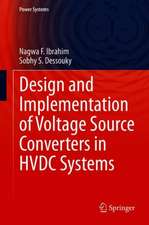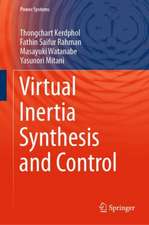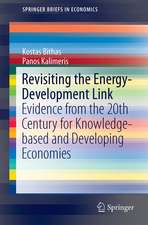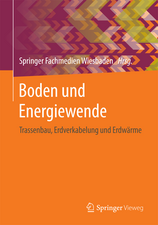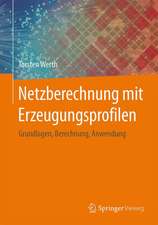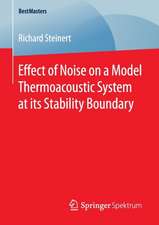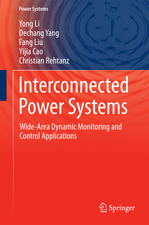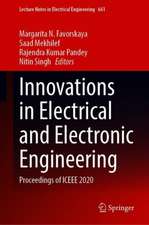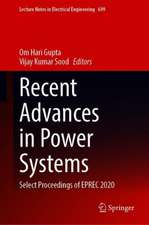European Guide to Power System Testing: The ERIGrid Holistic Approach for Evaluating Complex Smart Grid Configurations
Editat de Thomas I. Strasser, Erik C. W. de Jong, Maria Sosninaen Limba Engleză Paperback – 12 iun 2020
This book provides an overview of the ERIGrid validation methodology for validating CPES, a holistic power system testing method. It introduces readers to corresponding simulation and laboratory-based tools, including co-simulation, real-time simulation, and hardware-in-the-loop. Selected test cases and validation examples are provided, in order to support the theory discussed.
The book begins with an introduction to current power system testing methods and an overview of the ERIGrid system-level validation approach. It then moves on to discuss various validation methods, concepts and tools, including simulation and laboratory-based assessment methods. The book presents test cases and validation examples of the proposed methodologies and summarises the lessons learned from the holistic validation approach. In the final section of the book, the educational aspects of these methods, the outlook for the future, and overall conclusions are discussed.
Given its scope, the book will be of interest to researchers, engineers, and laboratory personnel in the fields of power systems and smart grids, as well as undergraduate and graduate students studying related engineering topics.
Preț: 174.99 lei
Nou
Puncte Express: 262
Preț estimativ în valută:
33.49€ • 34.83$ • 27.65£
33.49€ • 34.83$ • 27.65£
Carte tipărită la comandă
Livrare economică 12-26 aprilie
Preluare comenzi: 021 569.72.76
Specificații
ISBN-13: 9783030422738
ISBN-10: 3030422739
Pagini: 132
Ilustrații: XII, 132 p. 65 illus., 58 illus. in color.
Dimensiuni: 155 x 235 mm
Greutate: 0.21 kg
Ediția:1st ed. 2020
Editura: Springer International Publishing
Colecția Springer
Locul publicării:Cham, Switzerland
ISBN-10: 3030422739
Pagini: 132
Ilustrații: XII, 132 p. 65 illus., 58 illus. in color.
Dimensiuni: 155 x 235 mm
Greutate: 0.21 kg
Ediția:1st ed. 2020
Editura: Springer International Publishing
Colecția Springer
Locul publicării:Cham, Switzerland
Cuprins
Part I: Introduction.- Motivation.- State-of-the-Art and Current Practice in Power System Testing.- Overview of the ERIGrid System-Level Validation Approach.- Part II: Validation Methods, Concepts, and Tools.- Holistic System Integration and Testing Procedure.- Simulation-Based Assessment Methods.- Laboratory-Based Assessment Methods.- Laboratory Coupling Approach.- Part III: Test Cases, Case Studies, and Validation Examples.- Selected Test Cases.- Selected Case Studies and Validation Examples.- Experiences and Lessons Learned from the Holistic Validation Approach.- Part IV: Educational Aspects.- Training Needs.- Education Concepts and Material.- Part V: Outlook and Conclusions.- Outlook.- Conclusions
Notă biografică
Dr Thomas I Strasser received his master’s and PhD degrees from Vienna University of Technology, and completed his venia docendi (postdoctoral degree) in the field of automation at the same university. For the past several years, he has been a senior scientist at the Center for Energy, Austrian Institute of Technology (AIT). Before joining AIT, Dr Strasser spent more than six years as a senior researcher investigating advanced and reconfigurable automation and control systems at PROFACTOR research. Currently active as a senior lecturer (Privatdozent) at Vienna University of Technology, he is the author or co-author of more than 170 scientific publications (journal publications, book editorials and chapters, conference papers, conference proceedings papers, technical reports) and holds two patents in the above-mentioned areas. He serves as an Associate Editor for various Springer, Hindawi, and IEEE Journals. He is a member of the international IEC and IEEE standardisation working groups and a senior member of the IEEE, where he is also involved in several activities of the IES (AdCom member-at-large 2018-2020), SMCS (BoG member-at-large 2018-2020), and PES societies.
Professor Erik de Jong is a consultant specialising in the field of power electronics. His main areas of interest are the development and implementation of testing methods for large-scale power electronics and grid integration. He is the managing director of the Flex Power Grid Lab at KEMA Labs. His expertise covers various aspects of product development from basic engineering, modelling, and optimisation, to complete system validation. He has published in several conference proceedings and numerous peer-reviewed journals.
Maria Sosnina is a PR & Communications Manager at DERlab e.V. She completed her diploma degree in linguistics and pedagogy at the State University of St. Petersburg in 2010 with a thesis on intercultural business communication. In 2014, she received her master’s degree from the University of Kassel, Germany. She has extensive experience in dissemination activities for the FP7 projects STARGRID and COTEVOS, and for the Horizon 2020 projects ERIGrid and INTERPLAN, as well as communication activities for the DERlab Association.
Professor Erik de Jong is a consultant specialising in the field of power electronics. His main areas of interest are the development and implementation of testing methods for large-scale power electronics and grid integration. He is the managing director of the Flex Power Grid Lab at KEMA Labs. His expertise covers various aspects of product development from basic engineering, modelling, and optimisation, to complete system validation. He has published in several conference proceedings and numerous peer-reviewed journals.
Maria Sosnina is a PR & Communications Manager at DERlab e.V. She completed her diploma degree in linguistics and pedagogy at the State University of St. Petersburg in 2010 with a thesis on intercultural business communication. In 2014, she received her master’s degree from the University of Kassel, Germany. She has extensive experience in dissemination activities for the FP7 projects STARGRID and COTEVOS, and for the Horizon 2020 projects ERIGrid and INTERPLAN, as well as communication activities for the DERlab Association.
Textul de pe ultima copertă
This book is an open access book.
This book provides an overview of the ERIGrid validation methodology for validating CPES, a holistic power system testing method. It introduces readers to corresponding simulation and laboratory-based tools, including co-simulation, real-time simulation, and hardware-in-the-loop. Selected test cases and validation examples are provided, in order to support the theory discussed.
The book begins with an introduction to current power system testing methods and an overview of the ERIGrid system-level validation approach. It then moves on to discuss various validation methods, concepts and tools, including simulation and laboratory-based assessment methods. The book presents test cases and validation examples of the proposed methodologies and summarises the lessons learned from the holistic validation approach. In the final section of the book, the educational aspects of these methods, the outlook for the future, and overall conclusions are discussed.
Given its scope, the book will be of interest to researchers, engineers, and laboratory personnel in the fields of power systems and smart grids, as well as undergraduate and graduate students studying related engineering topics.
This book provides an overview of the ERIGrid validation methodology for validating CPES, a holistic power system testing method. It introduces readers to corresponding simulation and laboratory-based tools, including co-simulation, real-time simulation, and hardware-in-the-loop. Selected test cases and validation examples are provided, in order to support the theory discussed.
The book begins with an introduction to current power system testing methods and an overview of the ERIGrid system-level validation approach. It then moves on to discuss various validation methods, concepts and tools, including simulation and laboratory-based assessment methods. The book presents test cases and validation examples of the proposed methodologies and summarises the lessons learned from the holistic validation approach. In the final section of the book, the educational aspects of these methods, the outlook for the future, and overall conclusions are discussed.
Given its scope, the book will be of interest to researchers, engineers, and laboratory personnel in the fields of power systems and smart grids, as well as undergraduate and graduate students studying related engineering topics.
Caracteristici
Presents an innovative, holistic approach to validating smart grid configurations Utilises test cases, case studies, and selected examples to illustrate the proposed methodologies Approaches power system testing from a multi-domain, cyber-physical systems perspective
